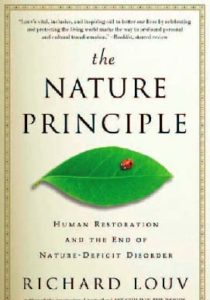People Can Benefit By Reconnecting with Nature
Algonquin Books of Chapel Hill, 2012
Reviewed by Roger Lohr
The Nature Principle: Human Restoration the End of Nature-Deficit Disorder is by Richard Louv, who wrote Last Child in the Woods, and has toured around the country recommending that we help kids discover or reconnect with nature. This can be called a movement and now Louv is extending his message to adults. His premise is supported by research and anecdotes that the connection to the natural world is fundamental to human health, well-being, spirit, and survival. Additionally, outdoor experiences may enhance the ability for us to learn and think, to expand our senses, and improve our physical and mental health.
 Much of the research cited in The Nature Principle is correlative rather than causal and conclusions are sometimes flimsy because the science isn’t all in and the available evidence is not entirely consistent. But there is no denying that many of us are multitaskers immersed in technology and media prevalence at such a level that Louv’s call for us to occasionally unplug, boot it down, get off line, and get outdoors really must be seriously considered.
Much of the research cited in The Nature Principle is correlative rather than causal and conclusions are sometimes flimsy because the science isn’t all in and the available evidence is not entirely consistent. But there is no denying that many of us are multitaskers immersed in technology and media prevalence at such a level that Louv’s call for us to occasionally unplug, boot it down, get off line, and get outdoors really must be seriously considered.
Patients suffering from emotional or physical ailments have had some success with nature-based therapy but there has been more research conducted regarding the impact of nature on mental health. We don’t really know the negative consequences of our de-natured lives on our health and well-being…and it is difficult to quantify impacts of being outdoors or the lack of being connected to nature.
So what is a typical nature therapy prescription? Therapeutic horticulture, animal-assisted therapy, care farming, eco-therapy, going for a hike, gardening, green exercise or adventure, visiting a local park, trail outings, being outdoors in nature alone or with others.
Louv’s book has a considerable amount of ideas for business: developers integration of nature, housing design, high technology and so on; planners creating a restorative workplace using natural elements to improve productivity, health, and happiness (indoor plants, outdoor view, abundant natural light); product design and new products and services; biomimicry (copying something in nature such as using spider silk, which is five times stronger than steel); city planners that use natural aspects within the business district; vertical farms, rooftop gardens; planting trees; pedestrian and bicycle paths, etc. Clearly, there is a need for a new business ethic to emerge. John Muir said, “When you tug on a string in nature, you find it is connected to everything else.” Imagine if such a concept was appropriated by businesses?
So what will it take for society to reconnect with nature on a major scale? Louv proposes a three ring approach:
- apply funded direct service programs in schools, community organizations, conservation organizations, etc,
- individuals and volunteers should pound the message drum, and
- networked associations without funding among communities, families, and individuals helping people to create change in their own lives.
Louv took his message about the Nature Principle to a high school in California and a homework assignment for those that attended his presentation was to find a place in nature and spend a half hour alone there. Students were asked to write a one page essay about their outdoor experience. Overwhelmingly, they returned from their solitary visit to the outdoors feeling better than when they left…and perhaps their findings can give us hope that we can benefit by regularly connecting with nature.
Roger Lohr of Hanover, NH owns and edits XCSkiResorts.com and has had published articles about sustainability, trails, and snowsports in regional and national media outlets.





